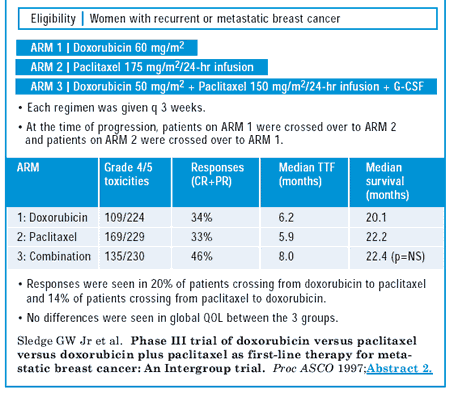|
You
are here: Home: BCU 4|2001: Section 4

Section 4
Randomized Trial of Docetaxel-Capecitabine
versus Docetaxel
CLINICAL
IMPLICATIONS
The docetaxel-capecitabine
study is intriguing, and there’s certainly a biologic rationale
for why that combination might be useful. In terms of toxicity,
that combination would be a lot more tolerable with capecitabine
dosed at 2,000 mg/m2, and I think you could do that without decreasing
the efficacy. But causing a few more side effects — if survival
really is prolonged — is something a lot of my patients would
be willing to do. But it’s difficult to know how to use the
data from this study in my practice, because the trial didn’t
have a traditional crossover.
The best study
we have on the question of combination chemotherapy in metastatic
disease was ECOG 1193 34, which randomized patients into one of
three arms — doxorubicin alone, paclitaxel alone or the combination.
The two single-agent arms crossed over to the other single agent
at the time of progression. The combination resulted in a slightly
higher response rate and a slightly longer time to progression but
no difference in quality of life and overall survival.
—Kathy
M i l l e r, MD


One could argue
this either way. The issue is: We don’t have crossover data,
so it’s all theoretical, although there is pre-clinical synergism.
But we don’t see too many trials with survival advantages in
late-line metastatic breast cancer. So, I’m not willing to
say that it would be just as effective to give these agents sequentially.
I’d rather err on the side of going with what we know, than
just saying,“Oh, it’s very likely to be the same.”
That’s too nihilistic for me.
There are certain
situations in treating metastatic breast cancer patients when we
really want to have the greatest possible impact on survival and
tumor control — and those are women with greater tumor burden,
maybe a little bit more rapidly progressive disease — where
often times we think about using combination chemotherapy. Up to
now, there really hasn’t been clear evidence there was any
benefit to giving combination therapy as opposed to sequential single
agents, and the sequential single agent theory had become very popular
over the last several years. But nonetheless, there are times where
you turn towards combination chemotherapy, and that’s when
we can turn to the docetaxel-capecitabine combination, because it
is one of the rare instances where you can actually say there is
a survival advantage. That’s not to say that there aren’t
going to be women for whom sequential use of single agents is not
more appropriate, particularly women with relatively asymptomatic
disease or indolent disease.
—Joyce
O’Shaughnessy, MD
The trial was
based on some very excellent pre-clinical science, and clinically
there’s some excellent data in colorectal cancer related to
intratumoral levels of thymidine phosphorylase.37 So, the scenario
makes great sense that patients receiving docetaxel had upregulation
of thymidine phosphorylase and supports the outcome of the trial.
On the other hand, patients with metastatic disease aren’t
cured.
So, here we
have findings that perhaps can help us find a more effective regimen
that could potentially improve curability in the adjuvant setting
with a lower tumor volume. Patients who would be candidates for
this combination might be those with extensive prior anthracycline
therapy and perhaps more rapidly progressive breast cancer —
lymphangitic spread, recurrent pleural effusion, perhaps liver metastases
— that you haven’t been able to control. If the patient
is having major symptoms or rapid progression, there is an indication
to use combinations that have higher response rates, because a month
or two could make a big difference. But these tend to be a minority
of the patients in clinical practice.
—Hyman
Muss, MD
Page
3 of 4
Back | Next
|
|
